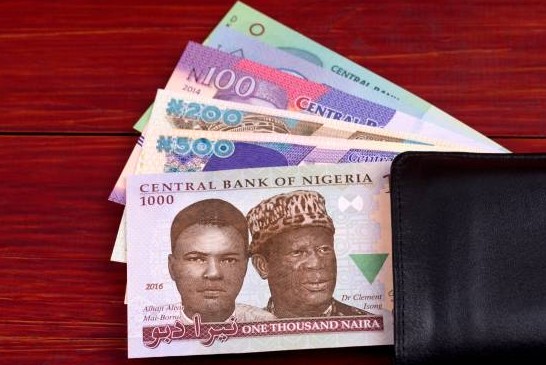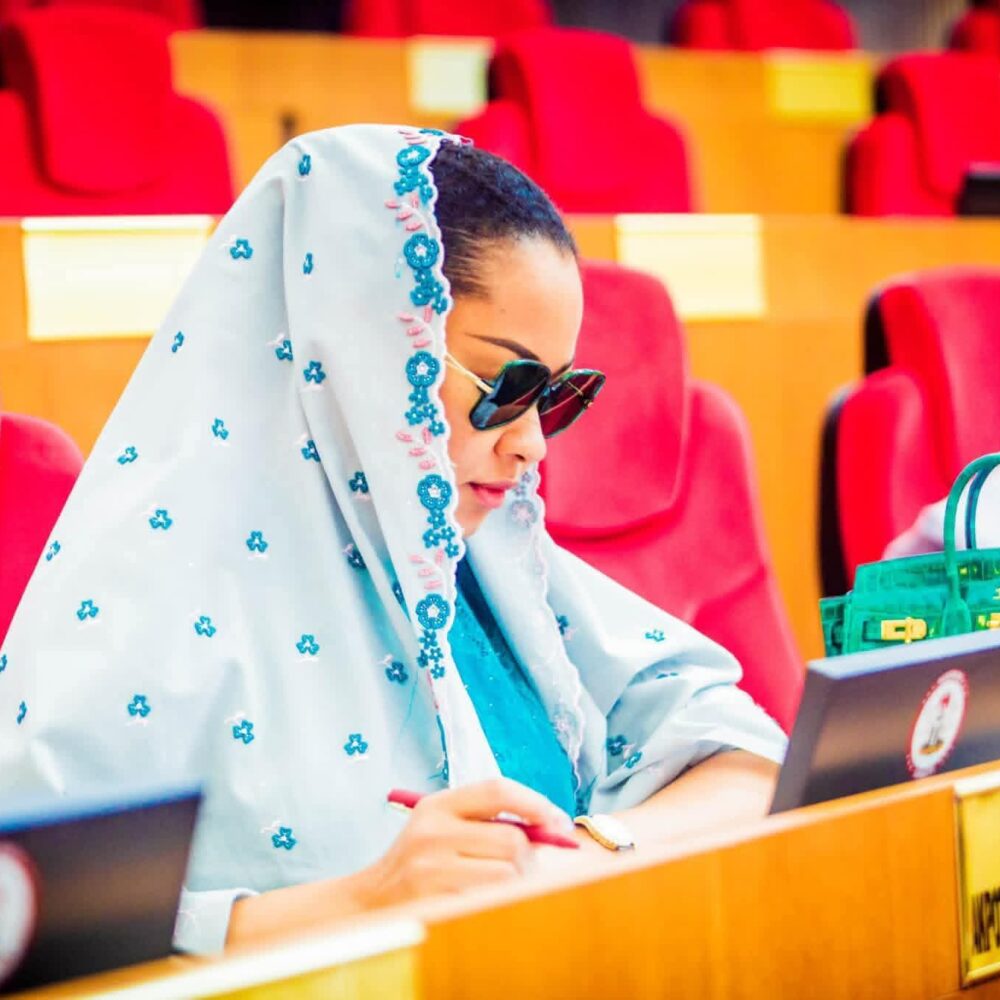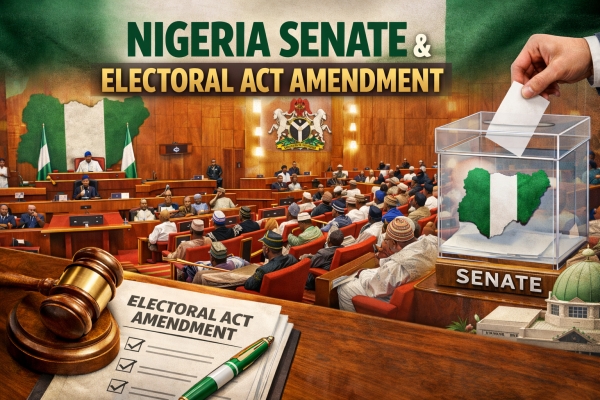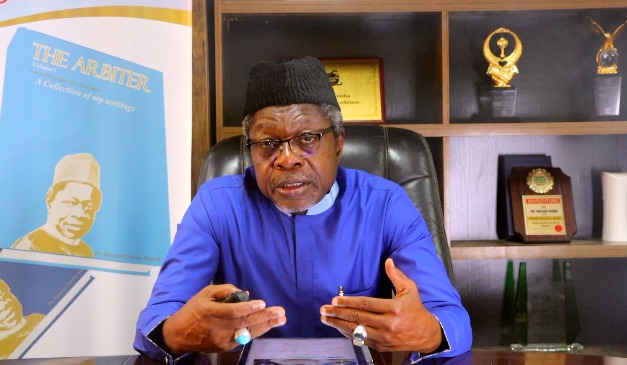“The strength of a nation’s currency is an expression of the vibrancy, virility and robustness of that country’s economy”
Late Sir Henry Boyo.
My current intervention on the absymal performance of our dear Naira, drew strength from the above, Late Sir Henry Boyo, Nigerian foremost Economist and Monetarist quote. Sir Boyo all through his activism as a newspaper columnist and Economic analyst, warned against how the CBN alongside Nigeria’s elites and forex dealers, not to forget how financial capitalist successfully made Naira an item of profiteering.
So sad, Sir Boyo has since left us, and the status quo he cautioned against and advice on how best to manage our Naira-Dollar exchange and foreign reserve together, is still a challenge today. May the Soul of Sir Henry Boyo continues to rest peacefully while the task for the rest of us alive is never to be discouraged but keep pressing on.
With hindsight, since November 2023, Naira has been in the news for it’s worse depreciation and value shrinking.
As a Political Economist with bias in Monetary, Fiscal and Trade policies, devoting my energy, research and empirical analysis engagement in the classroom, on radio, tv and newspaper to the sector, while contributing to numerous platforms, stakeholders gathering and meetings, as a patriotic citizen and intellectual.
Events in recent days, about the economy is critical, demanding answers from President Tinubu and Yemi Cardoso of CBN. How come FX unification and floating of the exchange regime did not stabilize Naira?
How come every monetary reform policies of present day CBN managers are falling flat and tumbling without rescuing our dear Naira? What alternative plans do they have to stop further naira devaluation and take action against people responsible for naira devaluation and profiteering from it? Is FX demand outstripping supply the problem or corruption in the sector?
Today, the Naira has lost over 80% of it’s value,exchanging at N,465 / $1 at the official I & E Window and N1,500 and above at the parallel market.
Unfortunately, at a recent outing, Yemi Cardoso, the CBN governor stated that naira is undervalued.
He made this claim at the Nigeria Economic Summit Group (NESG) event that projected Nigeria 2024 Economic Outlook in Lagos.
The statement caught me off guard, making me to seek further clarification on what then is the problem.Why couldn’t the Naira appreciate and gain value against dollar and other foreign currencies?
Meanwhile, there is a dimensions on the foreign exchange market in relation to accumulation of our nation’s external foreign reserves standing at $33billion according to the same, CBN, that has consistently increased dollar supply to the FX market.
For instance, in two weeks alone, the apex bank released $700million and $500 million, respectively, in January 2024.
Despite all this, naira remains poor and deep in depreciation, pointing to us, a clear indication that Nigeria’s economic situation is yet to overcome it’s imbalances. Talk of improvement under the Tinubu’s APC government, with it’s mouth watering and sugar quoted economic reforms.
And we need to tell ourselves the truth, reason being that a country’s economy is expected to be stable, on the strength of it’s currency valuation, and strongly backed by its foreign reserves earnings. Nevertheless, this speaks volume of the nation’s essential export competitiveness and impact on balance of trade as against imbalance and trade deficit.
Conversely, our case is different with high importation that induces naira depreciation while exportation on the other hand engineers currency appreciation. Thus, naira becomes a weak currency, a demonstration of a country with economic dilemma.
And talking of the undervalue of the Naira, Nigerians may need to ask questions concerning the different rates of exchange that have distorted the system, and the continued malpractices of Nigeria’s state intervention and market mechanism which sustained poverty of the CBN monetary policy over the years.
Nigerians could recall how Tinubu’s government in quick succession introduced the forex market unification reform otherwise known as floating or liberalization of the foreign exchange market sector with the goal of achieving naira stability and boosting investors’ confidence.
As you read through this article, readers should cast their mind back to previous exchange rates, before the floating regime of President Tinubu and Cardoso’s CBN. Naira remained resistant to the dollar at N473.83 to $1 officially at June 2023. This rate climbed to N800 to $1 dollar officially under the floating FX policies, a culminating depreciation of over 40 percent. That drew the attention of the World Bank, stating in a report Africa Pulse: Analysis of Issues shaping African Economic Feature, 2023. By listing Naira amongst the worst weakened currencies in sub Saharan Africa. Nigeria’s Naira, Angolan Kwanza toping the list with 40 percent depreciation, respectively.
Others are South Sudan 33 percent, Burundi 27percent, Democratic Republic of Congo 18 percent and Kenya 16 percent, Ghana 12 percent and Rwanda 11percent. Activities of parallel market exchanges is said to be one of the problems causing currencies depreciation amongst these African countries as it fuels inflationary distortion.
On the other hand, my quest led me to a recent fact about how the dollar is struggling against other currencies. The US dollar in January 2024 lost over 7 percent of its value due to inflation in the United States of America’s economy and it’s national budget contraction. Moreso, the US dollar lost 25 percent against most international currencies like Pound Sterling and Euro in the last year three years.
However, nobody is asking this critical question, in the sense that how come there’s dollar depreciation against the Euro and Sterling?
Rather, the Naira inexplicably failed to meaningfully appreciate against the dollar.
Paradoxically, the scourge of multiple exchange rates as portended by parallel forex market in the case of Nigeria is the failure and inability of the Nigerian state to protect the naira against unscrupulous individuals and group within the forex trading sector of our economy.
Although, Tinubu’s government applied for it’s FX market unification reform, but advice was given on how best the policy could translate to concrete result. Amongst the advices were to strengthen exportation sector, avoid further borrowings by CBN, eliminate insiders abuse and corruption within the official window as being perpetuated by players in the sectors with false forex claims.
Regrettably, the government looked the other way hoping the current system of it’s single naira exchange rate on it’s
I& E Window would do the magic,not considering the profiteering mindset of players and their attitude toward excessive capital accumulation.
Alarmingly, the current practice of Cardoso’s CBN monetary practice is not a departure from his predecessor, even though he claims to be an Orthodox monetarist, with focus on price stability.
This is laudable on paper for us, but must also target the reduction in high rate of unemployment which is a core mandate of the CBN as captured in the CBN Act 2007.
However, the apex bank at this point would still need to do some house keeping by ensuring the borrowed dollars currently infused into the economy in the name of payment of backlog FX demands, is given to the right people or businesses that have waited this long.
While the President Tinubu and Cardoso CBN forex market or liberalization,as well as floating of the FX equalization strategy is to close the gap between the official window and that of the parallel market rate, failure to achieve this goal rests on the authority not fine-tuning the right sanctions on players who are benefiting from the existence of multiplicity of exchange rates against the naira.
A daring boldness abuse of the foreign exchange market, made possible the weak regulation and leakages in our economic governance system, with insider abuse negating a level playing ground and distortions of the so-called free market system.
Sadly, except it change, the present system encourages “insolent rent seekers and disturbs the work and reward ethics as huge sums can be made without any direct contribution. Thus, there’s excess wealth accumulation by people sitting and hanging around the government in the name of being investors.
A situation that is eliminating genuine and concrete economic productivity, moonlighting as quick ways to wealth by figure distribution and percentage cut. That’s why the naira against the dollar by the CBN keeps suffering an endless cycle of devaluation technically or wickedly.
Our modest Way Forward
The net consequence of naira’s absymal performance is a recipe for economic disarticulation.
We suggest the current administration maintain a monetary framework and appropriate to stop naira weakness by improving our export sector to boost the nation’s foreign external reserves
Closing the gap between the official market and parallel-market rate has varied from about 10 -20 percent since December 2023 to the current N1,400/$1 official and N1,550/$1 at the parallel market February 2024.
To address this gap, the CBN would have to strengthen it’s weekly supply of dollar, through evidence monitoring channel to cut off excess on the part of banks and others engaging in small or large-scale round tripping and speculation in the FX market.
Lastly, we are a blessed nation with abundance of material resource endowment. So, this must be to our advantage to improve our export economy and balance of trade. In addition, is for the government to rethink it’s proclivity for loans, sales of Treasury papers and Bonds.
Painfully, these ones also have a way of increasing weaknesses of national currency, like the Naira.
I will still round off this piece with the very resounding advice from Late Sir Henry Boyo “CBN Save the Naira, Save Nigeria”
Adefolarin A. Olamilekan
Political Economist
Email: adefolarin77@gmail.com
08107407870; 08073814436





